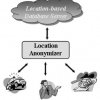Free Online Productivity Tools
i2Speak
i2Symbol
i2OCR
iTex2Img
iWeb2Print
iWeb2Shot
i2Type
iPdf2Split
iPdf2Merge
i2Bopomofo
i2Arabic
i2Style
i2Image
i2PDF
iLatex2Rtf
Sci2ools
211
click to vote
Publication
Towards Privacy-Aware Location-Based Database Servers
The wide spread of location-based services results in a strong market for location-detection devices (e.g., GPS-like devices, RFIDs, handheld devices, and cellular phones). Examples of location-based services include location-aware emergency service, location-based advertisement, live trac reports, and location-based store
nder. However, location-detection devices pose a major privacy threat on its users where it transmits private information (i.e., the location) to the server who may be untrustworthy. The existing model of location-based applications trades service with privacy where if a user wants to keep her private location information, she has to turn o
her location-detection device, i.e., unsubscribe from the service. This paper tackles this model in a way that protects the user privacy while keeping the functionality of location-based services. The main idea is to employ a trusted third party, the Location Anonymizer, that expands the user location into a spatial region such...
| Added | 20 Dec 2008 |
| Updated | 20 Dec 2008 |
| Type | Others |
| Year | 2006 |
| Where | PDM workshop in conjunction with ICDE |
| Authors | Mohamed F. Mokbel |
Comments (0)




